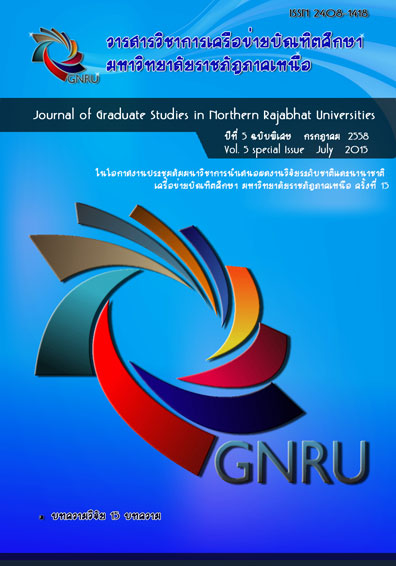อำนาจผลประโยชน์ทางการเมืองกับการวิเคราะห์กำหนดนโยบายสาธารณะ ขององค์การบริหารส่วนตำบล จังหวัดเพชรบูรณ์; Power of Political Interstand Public Policy Analysis of Sub-District Administrative Organization in Phetchabun Province
Main Article Content
Abstract
บทคัดย่อ
การวิจัยครั้งนี้มีวัตถุประสงค์ 1) เพื่อศึกษาการวิเคราะห์กำหนดนโยบายสาธารณะขององค์การบริหารส่วนตำบล จังหวัดเพชรบูรณ์ 2) เพื่อศึกษาบทบาทและกระบวนการกำหนดนโยบายสาธารณะของกลุ่มผลประโยชน์ทางการเมืองขององค์การบริหารส่วนตำบล จังหวัดเพชรบูรณ์ 3) เพื่อศึกษาสหสัมพันธ์ของปัจจัยที่มีอิทธิพลต่อการกำหนดนโยบายสาธารณะขององค์การบริหารส่วนตำบล จังหวัดเพชรบูรณ์ 4) เพื่อเสนอแนะแนวทางในการกำหนดนโยบายสาธารณะขององค์การบริหารส่วนตำบล จังหวัดเพชรบูรณ์ กลุ่มตัวอย่างที่ใช้ในการศึกษาครั้งนี้เป็น ข้าราชการ พนักงาน นักการเมืองและกลุ่มนักธุรกิจจำนวนทั้งสิ้น 1,891 คน เครื่องมือที่ใช้ เป็นแบบสอบถาม วิเคราะห์ค่าเฉลี่ย และส่วนเบี่ยงเบนมาตรฐาน และการวิเคราะห์สหสัมพันธ์คาโนนิคอน
ผลการวิจัยพบว่า 1. การวิเคราะห์การกำหนดนโยบายสาธารณะขององค์การบริหารส่วนตำบล ภาพรวมอยู่ในระดับมาก และพบว่ากระบวนการกำหนดนโยบายสาธารณะถูกกำหนดจากอำนาจรัฐส่วนกลางมากที่สุด รองลงมาด้านการเสนอทางเลือกการพัฒนาทางเลือกการมีส่วนร่วมของประชาชนและปัจจัยเกี่ยวกับความสัมพันธ์ระหว่างฝ่ายการเมืองกับฝ่ายบริหาร 2. บทบาทและกระบวนการกำหนดนโยบายสาธารณะของกุล่มผลประโยชน์ทางการเมืองขององค์การบริหารส่วนตำบลด้าน การใช้อำนาจผลประโยชน์ทางการเมืองของพนักงาน ข้าราชการ นักการเมืองและกลุ่มนักธุรกิจอยู่ในระดับมาก และพบว่าการใช้อำนาจผลประโยชน์ทางการเมืองของพนักงานด้านการให้ข้อมูลเสนอแนะฝ่ายการเมืองมากที่สุด 3. ความสัมพันธ์ระหว่างอำนาจผลประโยชน์ทางการเมืองและการกำหนดนโยบายสาธารณะขององค์การบริหารส่วนตำบลอำนาจผลประโยชน์ทางการเมืองมีอิทธิพลต่อการกำหนดนโยบายสาธารณะด้านกระบวนการกำหนดนโยบายสาธารณะอยู่ในระดับสูงมาก รองลงมาด้านการเสนอทางเลือก การพัฒนาทางเลือกการมีส่วนร่วมของประชาชนและปัจจัยเกี่ยวกับความสัมพันธ์ระหว่างฝ่ายบริหารกับฝ่ายการเมือง 4. การเสนอแนะแนวทางการกำหนดนโยบายสาธารณะขององค์การบริหารส่วนตำบล จังหวัดเพชรบูรณ์ สนับสนุนการให้ประชาชนเข้ามามีส่วนร่วมในการกำหนดนโยบาย เพื่อลดปัญหาการแทรกแชงจากฝ่ายการเมือง การป้องกันการทุจริตของพนักงาน ข้าราชการ และนักการเมืองในองค์การบริหารส่วนตำบล
Abstract
The purposes of the research were 1) to study about public policy analysis of sub-district administrative organizations in Phetchabun province 2) to study roles and processes of public policy decision-making of the political interest group in sub-district administrative organizations in Phetchabun province 3) to study the relationship of the factors affecting public policy decision-making of sub-district administrative organizations in Phetchabun province, and to 4) to suggest guidelines of public policy decision-making of sub-district administrative organizations in Phetchabun province. The populations with 1,819 samples used in the research were public servants, employees, politicians, and groups of businessmen. The research tool used to collect data was a questionnaire. The data was analyzed by a statistical packaged program with frequency, percent, mean, standard deviation, and canonical correlation analysis. The research findings were:
1. The overall result of public policy analysis of sub-strict administrative organizations in Phetchabun province washing. Meanwhile, a process of public policy decision-making decentralized by the central state power washing hest. 2. Roles and processes of public policy decision-making of the political interest group in sub-district administrative organizations in Phetchabun province and power usage for political interest of public servants, employees, politicians and groups of businessmen were high. 3. The relationship of power of political interest and public policy decision-making of sub-district administrative organizations; the power of political interest influencing the public policy, especially public policy decision-making, was high. Meanwhile, public participation based optional development proposition and the factors related to the relationship between political and administrative sectors were secondary. 4. Suggestions on guidelines of public policy decision-making of sub-district administrative organizations in Phetchabun; support for the public to participate in public policy decision-making in order to reduce intervention from the political sector and anticorruption of public servants, employees and politicians in the sub-district administrative organizations.


